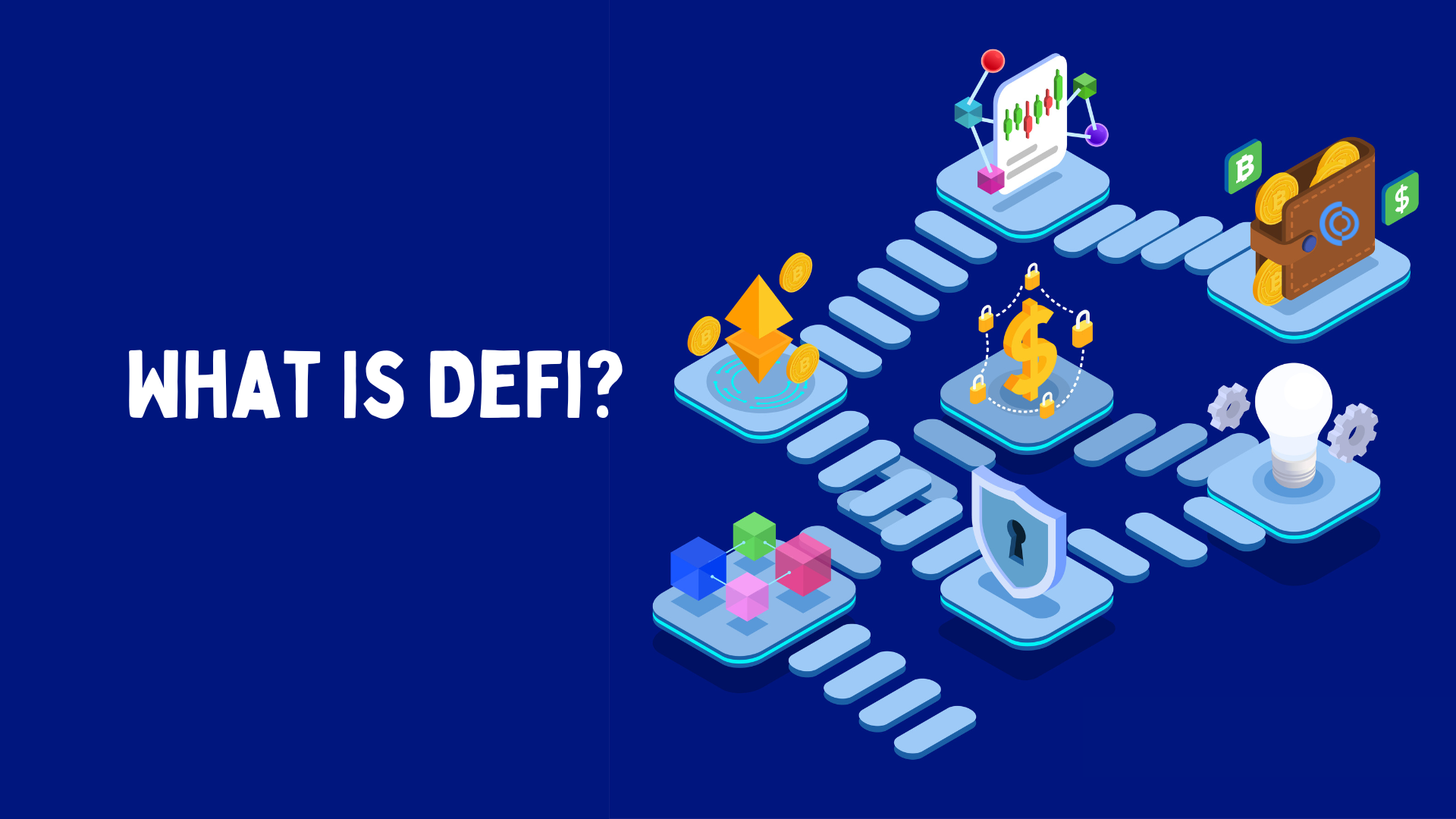What is (Decentralized Finance)DeFi?
 flynn rider
flynn rider
What is DeFi?
Decentralized finance (DeFi) is a new financial technology that challenges the existing centralized banking system. DeFi aims to abolish the costs charged by banks and other financial institutions while encouraging peer-to-peer transfers.
What is the difference between DeFi and CeFi?
DeFi uses a blockchain framework with smart contracts to execute financial transactions without intermediaries, boosting transparency and autonomy. CeFi, on the other hand, uses existing financial institutions as intermediaries, resulting in a more regulated and, in many cases, user-friendly environment.
What Are the Benefits of Decentralized Finance?
Decentralized finance uses Ethereum blockchain concepts to improve financial security and transparency, create liquidity and development prospects, and promote an integrated and standardized economic system.
Programmability.
Highly programmable smart contracts automate execution and allow for the creation of new financial instruments and digital assets.
Immutability.
Tamper-proof data coordination within a blockchain's decentralized design improves security and auditability.
Interoperability.
Ethereum's composable software stack ensures that DeFi protocols and applications are designed to work together. DeFi enables developers and product teams to expand on existing protocols, adapt interfaces, and integrate third-party apps. For this reason, DeFi protocols are frequently referred to as "money legos."
Transparency.
Every transaction on the public Ethereum blockchain is broadcast to and confirmed by other network users (Ethereum addresses are pseudo-anonymous encrypted keys). This level of transparency in transaction data not only enables rich data analysis but also ensures that network activity is accessible to all users. Ethereum and the DeFi protocols that operate on it are similarly created with open-source code that anybody can read, audit, and contribute to.
Permissionless.
Unlike traditional finance, DeFi is distinguished by its open, permissionless access: anyone having a crypto wallet and an Internet connection, regardless of location and frequently with no minimum quantity of assets necessary, can access DeFi applications based on Ethereum.
Self-Custody.
By interacting with permissionless financial applications and protocols using Web3 wallets such as MetaMask, DeFi market participants maintain custody and control over their funds.
How does DeFi work?
Though DeFi is commonly associated with cryptocurrencies, it extends beyond the production of new digital money or value. DeFi's smart contracts are intended to replace existing banking systems.
There are no banks or institutions to manage your money because DeFi applications do not require intermediaries to authorize transactions. Furthermore, the code is open to review by anybody, providing a sense of transparency in DeFi protocols. There are also international open networks. There are several applications available to users, the majority of them are based on the Ethereum blockchain.
What are the use cases of DeFi?
Decentralized Lending and Borrowing: DeFi enables individuals to lend and borrow funds without relying on traditional intermediaries like banks. Users can lend their cryptocurrencies and earn interest, or borrow assets with their crypto holdings as collateral.
Decentralized Exchanges (DEXs): DeFi has transformed the concept of exchange by creating decentralized exchanges. These platforms allow users to trade cryptocurrencies directly from their wallets, eliminating the need for intermediaries and custodial services.
Stablecoins and Stablecoin Trading: Stablecoins are cryptocurrencies that keep their value consistent by being linked to a reserve asset, usually a fiat currency. Defi use cases have pushed the usage of stablecoins, which offer stability and may be used for trading, remittances, and as a store of value inside the decentralized ecosystem.
Yield farming, also known as liquidity mining, is a process in which users provide liquidity to DeFi protocols in exchange for rewards. Users can stake their tokens or lend liquidity to several liquidity pools to gain more tokens or fees.
Decentralized Insurance: DeFi platforms are investigating the concept of decentralized insurance, in which users can acquire coverage for a variety of risks without relying on traditional insurance providers. This allows for more accessible and flexible insurance solutions.
Decentralized Asset Management: DeFi provides decentralized asset management platforms that enable users to manage and invest their funds directly, without the need for traditional asset management organizations. These platforms frequently use smart contracts to automate investment methods.
Prediction Markets: DeFi has encouraged the creation of prediction markets, in which users can wager on the result of a variety of events, including elections, sporting events, and even cryptocurrency values. These markets offer a decentralized platform for individuals to make predictions and perhaps receive incentives.
Decentralized Identity: DeFi has also looked into decentralized identity solutions, which allow users to keep control of their personal information and selectively share it with various entities without relying on centralized authority.
These are just a few examples of the popular use cases of DeFi. The DeFi ecosystem is continually evolving, and new use cases and applications are emerging as the technology matures and gains broader adoption.
Top 8 Leading DeFi Platforms of 2024
Now, let’s dive into the specifics of the top 8 DeFi platforms that are poised to make a significant impact in 2024. These platforms have been chosen based on their innovation, user adoption, and contributions to the decentralized finance ecosystem.
1. Uniswap
Uniswap is a forerunner in decentralized exchanges, providing a simple trading experience via automated liquidity pools. Its ongoing innovation and user-friendly interface ensure its domination in 2024, setting the norm for decentralized trading platforms.
2. Compound Finance
Compound Finance, known for its strong lending and borrowing rules, remains a key player in the DeFi space. The platform offers enticing interest rates, ensuring optimal asset utilization and meeting the needs of both lenders and borrowers in a dynamic financial market.
3. Aave
Aave distinguishes itself by offering revolutionary flash loans, which allow consumers to borrow without collateral for a limited time. This unique feature attracts a lot of attention, cementing Aave's status as a premier DeFi platform in 2024 and demonstrating cutting-edge financing methods.
4. MakerDAO
MakerDAO, which pioneered decentralized autonomy on the Ethereum blockchain, was instrumental in inventing the stablecoin DAI. The platform's governance concept and stablecoin mechanism continue to alter the DeFi landscape by bringing stability and governance innovation.
5. SushiSwap
SushiSwap, an automated market maker (AMM), is focused on increasing liquidity provision. SushiSwap, with its unique features and community-driven growth, will continue its position as a leading DeFi platform in 2024, contributing to liquidity innovation in the decentralized finance area.
6. PancakeSwap
PancakeSwap, which runs on the Binance Smart Chain, has gained popularity for its low transaction fees and quick confirmation times. PancakeSwap confirms its position as a user-friendly and cost-effective DeFi solution by providing a variety of services such as yield farming and decentralized exchange.
7. Yearn Finance
Yearn Finance's vaults are known for streamlining yield farming using automated procedures, resulting in higher returns for users. Yearn Finance, a favorite choice for people seeking passive income through DeFi, continues to demonstrate innovation and efficiency in the yield farming industry.
8. Curve Finance
Curve Finance, which specializes in stablecoin trading, reduces slippage while increasing efficiency in stablecoin exchanges. Its unique algorithm draws customers looking for dependable and low-risk trading choices, helping to maintain the DeFi market's stability and diversity.
The Future of DeFi:
The Future of DeFi is a highly anticipated and ever-changing topic. DeFi has immense potential to change the financial system, but numerous hurdles must be overcome before fully realizing its potential. In this Blog, We looked at what is DeFi and its work.
Subscribe to my newsletter
Read articles from flynn rider directly inside your inbox. Subscribe to the newsletter, and don't miss out.
Written by

flynn rider
flynn rider
I am a Blockchain enthusiast that enjoys talking about cryptocurrencies and their growth. By doing that, I hope to inspire aspiring entrepreneurs to come up with company concepts.